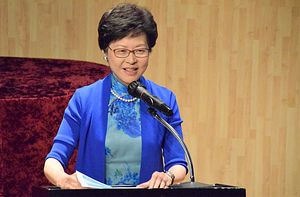On the second day of the Chinese Lunar Year of the Rooster and with less than three months until the elections for next chief executive, the political publicity parade has officially begun in Hong Kong. Three of the four contenders have been making the rounds on the campaign trail, trying desperately to prove their connectedness with the citizenry of the city with mixed results.
It seems the Hong Kong media has all but anointed Carrie Lam Cheng Yuet-ngor as the new chief executive, if news coverage is any premise for judgment. The South China Morning Post’s website politics page has separate tabs for each of the candidates. Hong Kong’s leading and oldest English-language newspaper, which was recently bought by Chinese e-commerce tycoon Jack Ma, lists the contenders in the order of Carrie Lam first, then Regina Ip, followed by John Tsang, and then finally Woo Kwok-hing.
Regina Ip has two pages of news summaries, John Tsang has a respectable eight pages, while Woo Kwok-hing has an unimpressive single page. Compare that with Carrie Lam’s section, which has 15 pages worth of summarized news items. This is not completely unreasonable given that Lam was the incumbent chief secretary, but Tsang was no slouch either as the finance minister until as recently as early January, when his resignation was accepted more than a month after its initial tender. What is even more impressive regarding this coverage is the fact that Lam was the last to announce her candidacy, a mere two weeks into the calendar year.
Insiders have openly commented that Lam has already been designated by the Chinese government as the next chief executive, and it would seem that local news media have been only too willing to acquiesce to their command.
To be fair, while officially this is a four horse race that is supposed to be determined by a 1,200-strong election committee comprised of civil servants and tycoons from the city, it is becoming an increasingly held belief that this is no real race at all. In the proceeding months it is likely and expected that the central government in Beijing will send signals about its preferred candidate, along with a round of soft and implied economic pressures on business sectors so that they fall into line and select the correct candidate.
So far, Lam has been clumsy at best in her public relations. In one instance, she handed a HK$500 (US$64) note to a street beggar. It was later revealed that this beggar was not in fact a local Hong Konger, but rather part of a syndicate of professional beggars from mainland China. In another one of her gaffes, Lam made an effort to use Hong Kong’s public transport — along with an entourage of reporters. Embarrassingly for Lam, the lifelong bureaucrat was so unfamiliar with the use of the MTR rail system’s ticketing system, that she did not know how to pass through the ticket barriers, though the electronic payment system is decades old, and commonly utilized.
Still, these instances will not matter to Beijing, and Lam is likely to remain the firm favorite. That does not mean the other candidates are just along for the ride. The incumbent Chief Executive CY Leung was never the front contender during his campaign five years ago. It was only after the revelation that his opponent, Henry Tang Ying-yen, had broken building codes at his private residences that Leung was then elevated to preferred candidate position. By the time it was revealed Leung himself had his own building code problems, it was too late for another to be chosen.

































